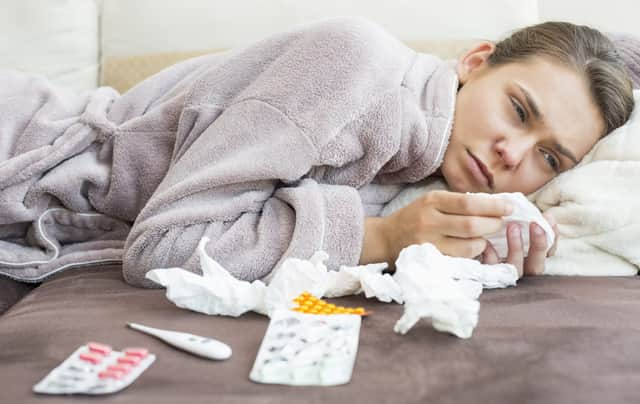Symptoms of ‘super cold’ spreading across UK and how to tell if it’s Covid


An increasing number of people are calling 111 and their GP after being struck down with symptoms of a so-called ‘super-cold’.
The UK Health Security Agency has reported a rise in calls to 111 about colds and flu, a cough, or difficulty breathing above expected levels, particularly among patients aged between 15 and 44.
Advertisement
Hide AdAdvertisement
Hide AdGP services have also seen an increase in patients seeking help with lower and upper respiratory tract infections.
The rise in calls related to cold and flu symptoms comes as many people have complained on social media of suffering with the “worst cold ever”.
Public Health England (PHE) is assessing the possible ‘super cold’ but has said there is currently no spike in confirmed flu-like symptoms.
What is a super cold?
Common colds and flu-like symptoms are expected during this time of year, so it is not unusual that many people have contracted a seasonal bug.
Advertisement
Hide AdAdvertisement
Hide AdHowever, health experts have said that people’s immunity to viruses is likely to have waned during the last 18 months of lockdown restrictions and social distancing, as we have been less exposed to these bugs than normal.
As such, this has led to a lot of people experiencing more severe cold and flu-like symptoms than normal, with sore throats, headaches, coughing and runny noses among the most commonly reported ailments.
Professor Neil Mabbott, personal chair in immunopathology at The Roslin Institute & Royal (Dick) School of Veterinary Studies, University of Edinburgh, said it is “unlikely” that there is a “super cold” in circulation, with the rough symptoms instead being a result of weakened immunity due to lockdown measures.
He explained: “This highlights the power of the lockdown, mask wearing, social distancing and sanitation measures introduced in response to the Covid-19 pandemic.
Advertisement
Hide AdAdvertisement
Hide Ad“Not only was this very effective in reducing transmission of the coronavirus within the community, but at the same time it had the additional benefit of reducing the spread of colds and other common transmissible diseases.
“As these measures are eased and people start mixing more indoors and travelling on public transport etc we can expect to see a significant rise in colds and other respiratory diseases.
“It is unlikely we are seeing the circulation of a ‘super cold’, rather our immune systems have had limited exposure to colds over the past 18 months, so our immunity to these diseases will have waned during this period and will be less effective against colds than would be expected normally.”
What are the symptoms?
If you have a cold, symptoms will usually appear gradually and will mainly affect your nose and throat.
According to the NHS, the most common symptoms include:
- a blocked or runny nose
- a sore throat
- headaches
- muscle aches
- coughs
- sneezing
- a raised temperature
- pressure in your ears and face
- loss of taste and smell
Advertisement
Hide AdAdvertisement
Hide AdFlu symptoms, on the other hand, will appear more quickly within a few hours and will affect more than just your nose and throat.
Common colds will typically disappear from one to two weeks after becoming infected, although symptoms may last slightly longer in children.
What should I do if I feel unwell?
NHS guidance states that you should see your GP if your symptoms do not improve after three weeks, if your symptoms suddenly get worse, or if you are feeling short of breath and develop chest pain.
Health experts are urging people not to self-diagnose their symptoms, but to take a Covid-19 test if they have a cough, high temperature or loss of taste and smell.
Advertisement
Hide AdAdvertisement
Hide AdAlex Richter, professor of clinical immunology at the University of Birmingham, said: “It is impossible to tell the difference between a cold and Covid-19 clinically.
“They present so similarly that only PCR testing can differentiate between the two. Lateral flow testing can help with screening but if someone has symptoms then they should go for a PCR swab test.”
For most people with a cold, drinking plenty of fluids, taking paracetamol and getting some rest should help to relieve cold and flu-like symptoms.
Self-isolating should not be necessary if you have confirmed you do not have Covid-19.
Advertisement
Hide AdAdvertisement
Hide AdAlan McNally, professor of microbial evolutionary genomics at the University of Birmingham, added: “If you have any symptoms of respiratory infection you should stay at home to prevent transmission and get a test done for Covid-19 to rule in or out.
“Trying to self-diagnose is a sure-fire way to send Covid-19 case rates soaring again.”
This article originally appeared on our sister site, NationalWorld.